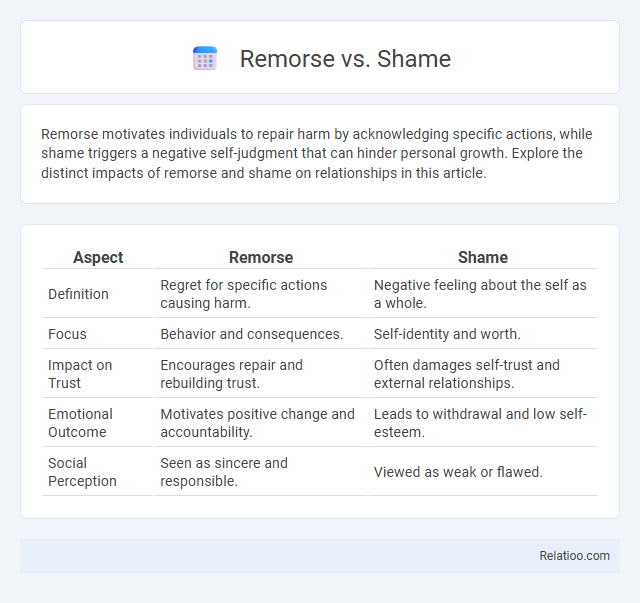Remorse motivates individuals to repair harm by acknowledging specific actions, while shame triggers a negative self-judgment that can hinder personal growth. Explore the distinct impacts of remorse and shame on relationships in this article.
Table of Comparison
| Aspect | Remorse | Shame |
|---|---|---|
| Definition | Regret for specific actions causing harm. | Negative feeling about the self as a whole. |
| Focus | Behavior and consequences. | Self-identity and worth. |
| Impact on Trust | Encourages repair and rebuilding trust. | Often damages self-trust and external relationships. |
| Emotional Outcome | Motivates positive change and accountability. | Leads to withdrawal and low self-esteem. |
| Social Perception | Seen as sincere and responsible. | Viewed as weak or flawed. |
Understanding Remorse: Definition and Core Elements
Remorse involves a deep sense of guilt and regret for actions causing harm, highlighting Your recognition of responsibility and desire to make amends. Unlike shame, which focuses on feeling flawed as a person, remorse targets specific behaviors and promotes empathy and personal growth. Core elements of remorse include acknowledgment of wrongdoing, emotional pain linked to the impact on others, and commitment to change.
Defining Shame: Psychological and Emotional Components
Shame is a powerful emotional experience characterized by a negative self-evaluation and a sense of worthlessness, often triggered by the perception of having violated social or moral standards. Unlike remorse, which focuses on regret for specific actions and motivates reparative behavior, shame targets the individual's core identity, inducing feelings of exposure, vulnerability, and a desire to hide or withdraw. Psychologically, shame can contribute to long-term impacts on self-esteem, interpersonal relationships, and mental health, highlighting its complex role in emotional regulation and social functioning.
Key Differences: Remorse vs Shame
Remorse involves a deep sense of guilt and regret specifically tied to a wrongful action, motivating individuals to make amends or change behavior. Shame, on the other hand, is a more pervasive feeling of worthlessness or self-disgust often linked to one's identity rather than a specific act. Key differences include remorse focusing on the action with an outward perspective on harm caused, while shame centers on the self, often leading to withdrawal or hiding.
Origins: What Triggers Remorse and Shame
Remorse originates from a recognition of personal wrongdoing that directly harms others, often triggered by empathy and moral reflection. Shame arises from a perceived failure to meet societal or internal standards, leading to feelings of inadequacy or exposure. You can distinguish these emotions by understanding that remorse focuses on actions and their impact, while shame centers on self-identity and social judgment.
Emotional Impact: How Remorse and Shame Affect Us
Remorse triggers a constructive emotional response that motivates you to make amends and improve behavior, fostering personal growth and healing. Shame, on the other hand, often leads to feelings of worthlessness and isolation, negatively impacting self-esteem and mental health. Both emotions significantly influence emotional well-being, but remorse encourages positive change while shame can cause emotional distress and hinder recovery.
Behavioral Responses: Actions Driven by Remorse or Shame
Actions driven by remorse often involve sincere efforts to make amends and change behavior, reflecting a deep understanding of the harm caused. Shame-motivated responses tend to lead to withdrawal, avoidance, or defensive behaviors aimed at protecting one's self-image rather than addressing the underlying issue. Your ability to recognize these distinctions can help foster healthier emotional processing and promote constructive behavioral changes.
Social Implications: Remorse and Shame in Relationships
Remorse fosters reconciliation by signaling genuine regret and a commitment to change, which strengthens trust and social bonds in relationships. Shame, often linked to feelings of worthlessness or embarrassment, can hinder open communication and provoke withdrawal or defensiveness, damaging interpersonal connections. Distinguishing between remorse and shame is crucial for healthy conflict resolution, as remorse encourages accountability while shame may undermine self-esteem and relational stability.
Psychological Outcomes: Growth, Healing, and Harm
Remorse promotes psychological growth by motivating individuals to acknowledge mistakes and seek forgiveness, fostering healing and personal development. Shame often leads to feelings of worthlessness and social withdrawal, causing psychological harm and impeding emotional recovery. Understanding the distinctions between remorse and shame is crucial for therapeutic interventions aimed at transforming pain into constructive growth and healing.
Overcoming Negative Effects: Coping Strategies
Overcoming the negative effects of remorse, shame, and guilt involves distinct coping strategies tailored to each emotional experience. Practicing self-compassion and seeking social support helps mitigate shame's debilitating self-criticism, while cognitive-behavioral techniques assist in reframing guilt to promote accountability without self-punishment. Mindfulness and emotional regulation improve the ability to process remorse constructively, enabling individuals to learn from mistakes and foster personal growth.
Cultivating Healthy Emotional Awareness
Understanding the differences between remorse, shame, and guilt is essential for cultivating healthy emotional awareness and fostering personal growth. Remorse involves feeling regret for specific actions, encouraging accountability and positive change, while shame focuses on self-condemnation and can damage your self-esteem. Recognizing these emotions allows you to address your feelings constructively, promoting resilience and emotional well-being.

Infographic: Remorse vs Shame
 relatioo.com
relatioo.com